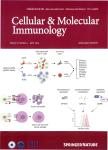The unique role of innate lymphoid cells in cancer and the hepatic microenvironment
作者机构:The University of Queensland Diamantina InstituteFaculty of MedicineThe University of QueenslandWoolloongabbaQLD4102Australia
出 版 物:《Cellular & Molecular Immunology》 (中国免疫学杂志(英文版))
年 卷 期:2022年第19卷第9期
页 面:1012-1029页
核心收录:
学科分类:1001[医学-基础医学(可授医学、理学学位)] 100102[医学-免疫学] 10[医学]
基 金:Open Access funding enabled and organized by CAUL and its Member Institutions
主 题:Inflammation Tumor ILC subsets Cytokines Progenitors
摘 要:Cancer is a complex disease,and despite incredible progress over the last decade,it remains the leading cause of death *** cancers,including hepatocellular carcinoma(HCC),and liver metastases are distinct from other cancers in that they typically emerge as a consequence of long-term low-grade *** the mechanisms that underpin inflammation-driven tissue remodeling of the hepatic immune environment is likely to provide new insights into much needed treatments for this devastating *** 1 innate lymphoid cells(ILCs),which include natural killer(NK)cells and ILC1s,are particularly enriched in the liver and thought to contribute to the pathogenesis of a number of liver diseases,including *** cells are an attractive,but underexplored,therapeutic target in hepatic disease due to their role in immunosurveillance and their ability to recognize and eliminate malignant ***1s are closely related to and share many phenotypic features with NK cells but are less well ***,their utility in immunotherapeutic approaches is not yet well ***,we review our current understanding of ILCs in cancer with a particular focus on liver and liver-related diseases.



